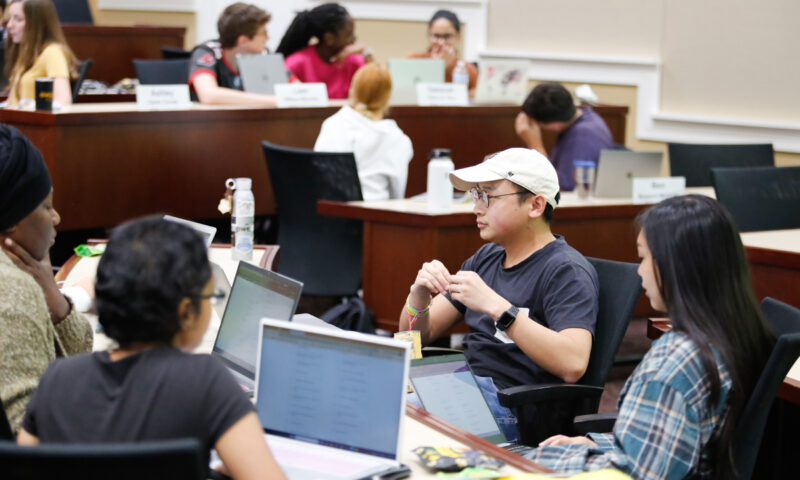The closer you get to completing your undergraduate education, the closer you are to facing the infamous accounting dilemma: tax or audit? As you begin to compare each of these two career paths, it is important to consider the industry it will lead you into and how you will get there.
Flexibility of Tax
Being a tax accountant does not necessarily mean filing sky-high piles of 1040s. On the contrary, the tax industry offers a broad variety of opportunities, meaning many people can find a niche within the tax profession that engages them every day. From researching the tax implications of proposed cryptocurrency legislation to helping a client navigate the tax considerations of a highly anticipated acquisition, the tax profession can be a fascinating industry for many capable accountants. McIntire understands this reality and prepares its students accordingly.
According to Professor Susan Porter, a member of McIntire’s Accounting faculty, “Many people do not understand taxes, and I enjoyed helping individuals and businesses determine the best tax strategy for them.” She highlights a key difference between the dynamic that auditors and tax consultants have with their respective clients. Tax consultants tend to take a position of guidance, helping their clients navigate the complex landscape of tax law. Professor Porter describes how rewarding this type of work can be, particularly in the face of “ever-changing tax laws.” Therefore, naturally curious people and those who enjoy working in a dynamic environment would find themselves at home in the field of tax consulting.
Reliable Profession and Constant Learning
As mentioned by Professor Porter, taxes can be complicated. However, I challenge you to see this fact as an asset rather than as a liability. The complexity of taxes means that demand for tax consultants is here to stay. Fortunately, many accounting firms understand that new hires have a minimal understanding of tax law, let alone comprehensive tax strategy. As a result, these firms invest in the knowledge of their less experienced staff and constantly assign new hires to experienced teams to support this continued learning process. In other words, they will teach what you need to know, and tax will no longer seem like an intimidating concept.
In the same way that doctors and lawyers specialize in certain areas within their profession, many tax accountants develop deep expertise in specific areas of tax law throughout their career. The good news is that you have a lot of control over which areas you want to specialize in.
Professor Porter, for example, developed a deep expertise in the areas of tax law pertaining to partnerships and LLCs. In my own experience, I worked with an individual who solely specialized in passive foreign investment companies (PFICs), which are notoriously complex. This person was commonly asked to consult on specific projects for which his expertise was relevant. After working with each of these professionals, it is clear that they have found a field that they genuinely enjoy.
McIntire’s Tax Consulting Track Teaches You How to Learn
Our curriculum focuses less on the technical tax aspects and, instead, prioritizes the development of professional skills that are applicable to numerous workplace environments.
The technical classes that are required try to avoid teaching tax minutia that you may never use in your career. Instead, the program focuses on necessary skills that will serve you well, no matter where you find yourself within the tax practice. Among these skills are tax research, which aims to help students decipher the legal jargon inside the Internal Revenue Code (IRC), and taxation of partnerships, which are common tools utilized in many tax strategies and organizational structures.
In addition to these technical classes, McIntire’s Tax Consulting track offers a wide range of electives that students can utilize to help discover areas of business that interest them. Among these include Cybersecurity, Financial Trading, Judgement & Decision Making, Real Estate Investments, and a host of other options taught by our excellent faculty.
Professor Porter highlights the professional skills that McIntire develops within its students. She cites the heavy emphasis on group work, teaching students how to work in teams that simulate realistic workplace dynamics. She further explains how, “without exception, the faculty are dedicated, empathetic and caring.” They exhibit a clear interest in the well-being of their students and constantly strive to find the best way to tailor each lesson to the students’ learning styles.
Hopefully, now the word “tax” is less intimidating. At the end of the day, your understanding of accounting fundamentals is the perfect starting point for entering the tax consulting industry. If you enjoy intellectual challenges and rewarding workplace dynamics, please consider applying to McIntire’s M.S. in Accounting Program with a concentration in Tax Consulting.
Reach out to a McIntire Student Ambassador to learn more about the program and the University of Virginia.



